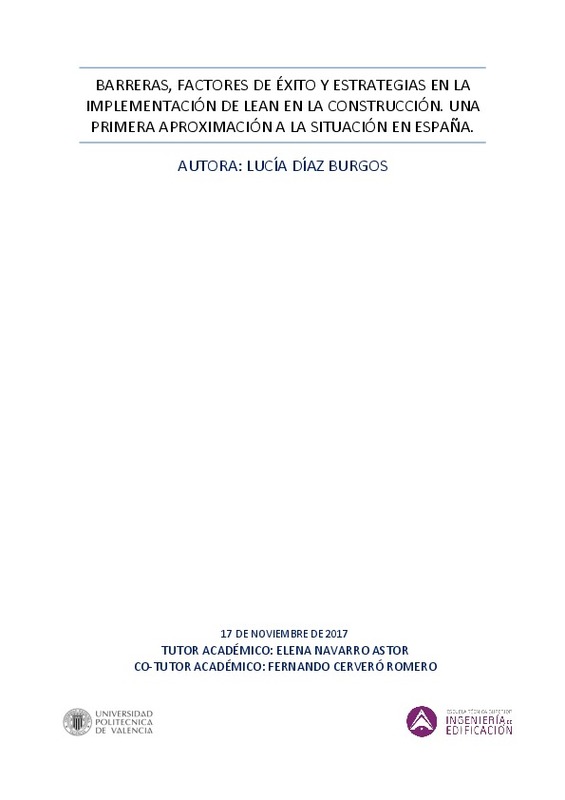JavaScript is disabled for your browser. Some features of this site may not work without it.
Buscar en RiuNet
Listar
Mi cuenta
Estadísticas
Ayuda RiuNet
Admin. UPV
Barreras, factores de éxito y estrategias en la implementación de LEAN en la construcción. Una primera aproximación a la situación en España
Mostrar el registro sencillo del ítem
Ficheros en el ítem
| dc.contributor.advisor | Navarro Astor, Elena
|
es_ES |
| dc.contributor.author | Díaz Burgos, Lucía
|
es_ES |
| dc.date.accessioned | 2018-02-07T14:52:51Z | |
| dc.date.available | 2018-02-07T14:52:51Z | |
| dc.date.created | 2017-11-22 | |
| dc.date.issued | 2018-02-07 | es_ES |
| dc.identifier.uri | http://hdl.handle.net/10251/97426 | |
| dc.description.abstract | [ES] Numerosos estudios internacionales han demostrado que la aplicación de los conceptos de Lean en la construcción, han traído beneficios considerables en cuanto a la mejora en la gestión del proceso constructivo. Por otro lado, también es sabido que su implantación viene dándose de manera paulatina e incluso lenta, debido a una serie de factores que afectan este proceso. El factor humano juega un papel muy importante en la gestión de proyectos de construcción, particularmente en la filosofía Lean, cuyo pilar fundamental se basa en la gestión de personas. Estos factores, tanto positivos como negativos, que afectan directamente en la implantación de esta filosofía, han sido estudiados en diversas partes del mundo con mayor o menor profundidad, no tanto así en España. El objetivo principal que se plantea en el presente trabajo es conocer qué barreras vinculadas a las personas impiden o limitan la correcta implementación de la filosofía Lean en la construcción; así como también conocer qué factores de éxito la pueden afectar, y las posibles estrategias a seguir para evitar dichas barreras, o mitigar su aparición, y para fortalecer los factores de éxito. Para lograr dicho objetivo, se realiza una revisión de estudios y experiencias internacionales sobre barreras, factores de éxito y estrategias a seguir, vinculadas a las personas, que afectan la implantación de Lean en la construcción, así como, la recopilación de información a través de entrevistas a profesionales vinculados a la construcción sobre el desarrollo de esta temática en España. Por último, de la comparación de los resultados obtenidos se extraerán conclusiones y se desarrollarán posibles futuras líneas de investigación. | es_ES |
| dc.description.abstract | [EN] Numerous international studies have shown that the application of Lean concepts in construction has brought considerable benefits in terms of improving the management of the construction process. On the other hand, it is also known that its implementation has been gradual and even slow, due to a series of factors that affect this process. The human factor plays a very important role in the management of construction projects, particularly in the Lean philosophy, whose fundamental pillar is based on the management of people. These factors, both positive and negative, that directly affect the implementation of this philosophy, have been studied in different parts of the world with more or less depth, not so much in Spain. The main objective that arises in the present work is to know what barriers linked to people impede or limit the correct implementation of the Lean philosophy in construction; as well as knowing what factors of success can affect it, and the possible strategies to follow to avoid these barriers, or mitigate their appearance, and to strengthen the success factors. To achieve this objective, a review of international studies and experiences on barriers, success factors and strategies to be followed, linked to the people that affect the implementation of Lean in construction, as well as, the collection of information through interviews, is carried out to professionals linked to construction on the development of this subject in Spain. Finally, from the comparison of the results obtained, conclusions will be drawn and possible future lines of research will be developed. | es_ES |
| dc.format.extent | 144 | es_ES |
| dc.language | Español | es_ES |
| dc.publisher | Universitat Politècnica de València | es_ES |
| dc.rights | Reserva de todos los derechos | es_ES |
| dc.subject | Sistemas de información en la gestión | es_ES |
| dc.subject | Personas (Actitudes) | es_ES |
| dc.subject | Barreras de entrada (Organización industrial) | es_ES |
| dc.subject | Éxito en los negocios | es_ES |
| dc.subject | Planificación empresarial | es_ES |
| dc.subject | Entrevistas | es_ES |
| dc.subject | Lean manufacturing | es_ES |
| dc.subject | Building information modeling | es_ES |
| dc.subject | People (Attitudes) | es_ES |
| dc.subject | Barriers to entry (Industrial organization) | es_ES |
| dc.subject | Success in business | es_ES |
| dc.subject | Business Planning | es_ES |
| dc.subject | Interviewing | es_ES |
| dc.subject.classification | ORGANIZACION DE EMPRESAS | es_ES |
| dc.subject.other | Máster Universitario en Edificación-Màster Universitari en Edificació | es_ES |
| dc.title | Barreras, factores de éxito y estrategias en la implementación de LEAN en la construcción. Una primera aproximación a la situación en España | es_ES |
| dc.type | Tesis de máster | es_ES |
| dc.rights.accessRights | Abierto | es_ES |
| dc.contributor.affiliation | Universitat Politècnica de València. Escuela Técnica Superior de Gestión en la Edificación - Escola Tècnica Superior de Gestió en l'Edificació | es_ES |
| dc.contributor.affiliation | Universitat Politècnica de València. Departamento de Organización de Empresas - Departament d'Organització d'Empreses | es_ES |
| dc.description.bibliographicCitation | Díaz Burgos, L. (2017). Barreras, factores de éxito y estrategias en la implementación de LEAN en la construcción. Una primera aproximación a la situación en España. http://hdl.handle.net/10251/97426 | es_ES |
| dc.description.accrualMethod | TFGM | es_ES |
| dc.relation.pasarela | TFGM\78271 | es_ES |
Este ítem aparece en la(s) siguiente(s) colección(ones)
-
ETSIE - Trabajos académicos [2383]
Escuela Técnica Superior de Ingenieria de Edificación






